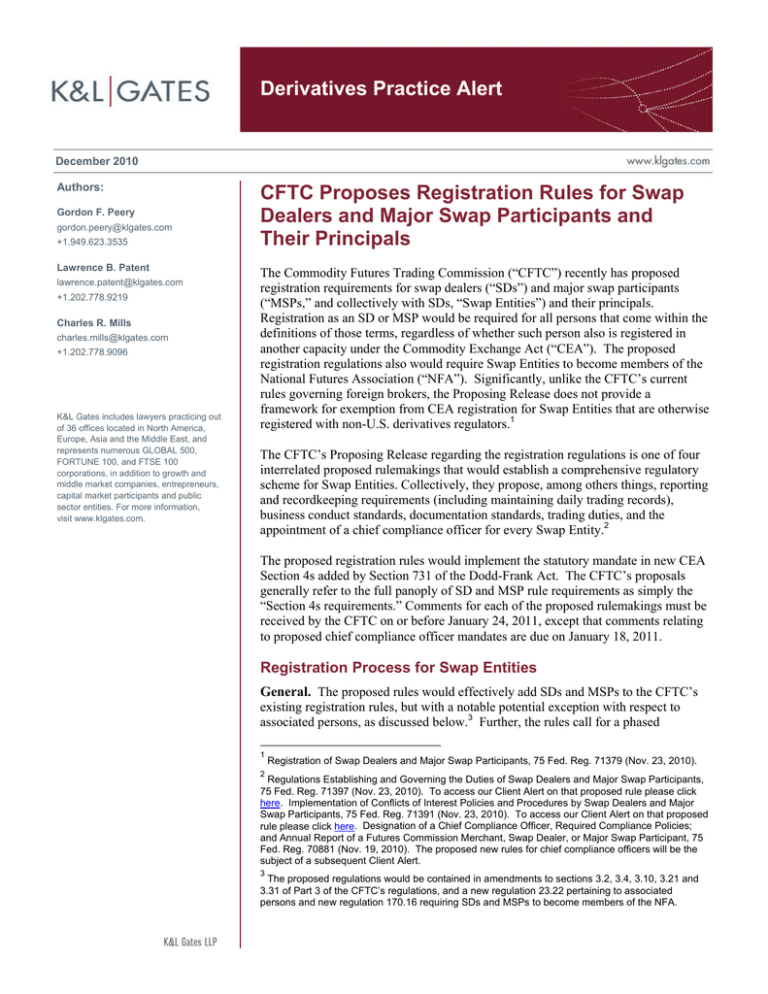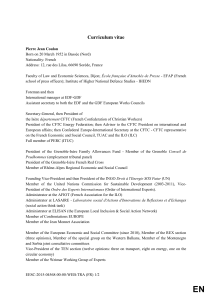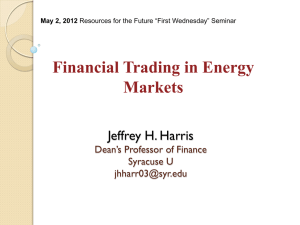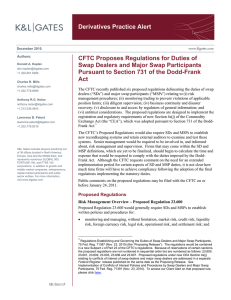
Derivatives Practice Alert
December 2010
Authors:
Gordon F. Peery
gordon.peery@klgates.com
+1.949.623.3535
Lawrence B. Patent
lawrence.patent@klgates.com
+1.202.778.9219
Charles R. Mills
charles.mills@klgates.com
+1.202.778.9096
K&L Gates includes lawyers practicing out
of 36 offices located in North America,
Europe, Asia and the Middle East, and
represents numerous GLOBAL 500,
FORTUNE 100, and FTSE 100
corporations, in addition to growth and
middle market companies, entrepreneurs,
capital market participants and public
sector entities. For more information,
visit www.klgates.com.
CFTC Proposes Registration Rules for Swap
Dealers and Major Swap Participants and
Their Principals
The Commodity Futures Trading Commission (“CFTC”) recently has proposed
registration requirements for swap dealers (“SDs”) and major swap participants
(“MSPs,” and collectively with SDs, “Swap Entities”) and their principals.
Registration as an SD or MSP would be required for all persons that come within the
definitions of those terms, regardless of whether such person also is registered in
another capacity under the Commodity Exchange Act (“CEA”). The proposed
registration regulations also would require Swap Entities to become members of the
National Futures Association (“NFA”). Significantly, unlike the CFTC’s current
rules governing foreign brokers, the Proposing Release does not provide a
framework for exemption from CEA registration for Swap Entities that are otherwise
registered with non-U.S. derivatives regulators.1
The CFTC’s Proposing Release regarding the registration regulations is one of four
interrelated proposed rulemakings that would establish a comprehensive regulatory
scheme for Swap Entities. Collectively, they propose, among others things, reporting
and recordkeeping requirements (including maintaining daily trading records),
business conduct standards, documentation standards, trading duties, and the
appointment of a chief compliance officer for every Swap Entity.2
The proposed registration rules would implement the statutory mandate in new CEA
Section 4s added by Section 731 of the Dodd-Frank Act. The CFTC’s proposals
generally refer to the full panoply of SD and MSP rule requirements as simply the
“Section 4s requirements.” Comments for each of the proposed rulemakings must be
received by the CFTC on or before January 24, 2011, except that comments relating
to proposed chief compliance officer mandates are due on January 18, 2011.
Registration Process for Swap Entities
General. The proposed rules would effectively add SDs and MSPs to the CFTC’s
existing registration rules, but with a notable potential exception with respect to
associated persons, as discussed below.3 Further, the rules call for a phased
1
Registration of Swap Dealers and Major Swap Participants, 75 Fed. Reg. 71379 (Nov. 23, 2010).
2
Regulations Establishing and Governing the Duties of Swap Dealers and Major Swap Participants,
75 Fed. Reg. 71397 (Nov. 23, 2010). To access our Client Alert on that proposed rule please click
here. Implementation of Conflicts of Interest Policies and Procedures by Swap Dealers and Major
Swap Participants, 75 Fed. Reg. 71391 (Nov. 23, 2010). To access our Client Alert on that proposed
rule please click here. Designation of a Chief Compliance Officer, Required Compliance Policies;
and Annual Report of a Futures Commission Merchant, Swap Dealer, or Major Swap Participant, 75
Fed. Reg. 70881 (Nov. 19, 2010). The proposed new rules for chief compliance officers will be the
subject of a subsequent Client Alert.
3
The proposed regulations would be contained in amendments to sections 3.2, 3.4, 3.10, 3.21 and
3.31 of Part 3 of the CFTC’s regulations, and a new regulation 23.22 pertaining to associated
persons and new regulation 170.16 requiring SDs and MSPs to become members of the NFA.
Derivatives Practice Alert
implementation – with voluntary, “provisional
registration” starting April 15, 2011 – because
Dodd-Frank requires promulgation of Swap Entity
registration rules by July 21, 2011, but the
rulemakings defining SDs and MSPs and
establishing their substantive regulatory
requirements will not be effective until a later date
or dates. The CFTC has proposed this approach to
foster continuity of the business operations of Swap
Entities and to avoid undue market disruption.
Provisional Registration. The proposed rules
would permit those firms wishing to be registered at
the earliest possible date to begin applying for
registration as an SD or MSP ahead of the July 21
date, starting on April 15, 2011. Registrants that do
so would be responsible for ongoing compliance
with respect to new rules as they become effective.
SDs and MSPs who have not applied for registration
by July 21 would be required to apply for
registration not later than the effective date of the
applicable definition.
SDs and MSPs that provisionally register will
become fully registered once all the other swap rules
are adopted and effective, provided they demonstrate
compliance with all applicable regulations. A Swap
Entity that cannot show compliance within the
prescribed time frame would receive a notice of
deficiency and would have 30 days to cure such
deficiency or withdraw its application for
registration. Upon withdrawal, the Swap Entity
would be prohibited from engaging in any new
activity requiring registration (unless such entity
subsequently registers and is in compliance with
applicable regulations). However, swap transactions
entered into prior to a notice of deficiency would not
be affected.
Registration Process for Swap Entities and
Their Principals. Under the proposed rules, Swap
Entities would register with, and become members
of, NFA by filing a Form 7-R electronically with the
NFA via its online registration system. Swap
Entities would need to show compliance with any
requirements of CEA Section 4s and regulations
thereunder already in effect at the time a Form 7-R
is filed, or would be required to demonstrate
compliance within a prescribed time frame
following the effective dates of subsequently
implemented Section 4s regulations. A Swap
Entity’s Form 7-R filing would authorize the CFTC
to conduct on-site inspection to ascertain the Swap
Entity’s compliance with the new regulatory
requirements. Swap Entities would be required at
least annually to review and update any information
that they provide to the NFA and the CFTC.
Swap Entities also would be required to file an NFA
Form 8-R and fingerprint card for each principal
and the NFA would conduct background checks on
them. The CFTC proposal, however, would amend
existing Rule 3.21 to exempt outside directors from
the fingerprint requirement if, in lieu of filing a
fingerprint card, he or she submits a notice stating
that he or she is not engaged in soliciting business
for the firm, handling its transactions, keeping its
records or supervising those so engaged. As is the
case for principals of existing CEA registrants, there
would be no testing requirements for principals of
SDs and MSPs.
Requirements for Associated Persons. The
CFTC’s proposal does not expressly provide for
registration, testing, fingerprinting, or NFA
membership of associated persons of an SD or
MSP. The proposed rules, however, would require
that each SD and MSP be responsible for
determining that all persons associated with it are
not subject to a statutory disqualification as that
term is defined in CEA Sections 8a(2) and 8a(3).
This is a distinct difference from the current regime
for registration of associated persons of other
commodity registrants. The CFTC proposal
expressly requests comment on how Swap Entities
could fulfill a requirement to determine that
associated persons are not subject to statutory
disqualifications. The release suggested possible
alternatives, including the voluntary or required
submission of identification and fingerprint cards to
the NFA for it to conduct the fitness review.
The CFTC proposal also notes that Dodd-Frank’s
statutory definition of an associated person of an SD
or MSP is not limited to natural persons. This
contrasts with the definition of associated persons
for all other CEA registrants, which limits them to
natural persons. The proposal does not include a
definition of associated person and implies that the
CFTC will rely on the definition in Dodd-Frank.
The CFTC, however, expressly requests comment
on whether it should by regulation restrict
December 2010
2
Derivatives Practice Alert
associated persons of swap entities to natural
persons.
Comments Sought on Potential
Alternatives for Allocating Regulatory
Responsibilities Between the CFTC
and NFA
The CFTC has requested public comment regarding
the appropriate allocation between the CFTC and the
NFA of responsibility for determining initial and
ongoing compliance by Swap Entities with the CEA
and the CFTC and NFA rules. Currently, the NFA
registers and then through examinations determines
a firm’s ongoing compliance with CEA, CFTC and
NFA requirements. The CFTC has sought public
comment whether some responsibility for
determining an SD’s or MSP’s ongoing compliance
should be reposed with the CFTC. It raises for
comment three alternative plans:
•
Give the CFTC direct responsibility for
monitoring compliance by Swap Entities with
all requirements applicable to them under the
CEA and CFTC regulations;
•
Delegate responsibility to the NFA for
monitoring regulatory compliance, subject to
CFTC oversight; or
•
Apportion and assign different compliance
oversight to the CFTC and the NFA.
of the United States” or “contravene rules or
regulations the CFTC may promulgate to prevent
evasion.”
The Proposing Release indicates that the CFTC
generally would not require a person to register as
an SD where:
•
The person’s only connection to the United
States is that the person uses a U.S.-registered
swap execution facility, designated clearing
organization or designated contract market in
connection with their swap dealing activities, or
reports swaps to a U.S.-registered swap data
repository; or
•
The person’s dealing activity has no connection
or effect of any kind, direct or indirect, whether
through affiliates or otherwise, to U.S.
commerce.
The roles and responsibilities of the CFTC and NFA
are in a period of flux due to current budgetary
constraints on the CFTC, the possibility of the next
Congress’s not approving all or a part of certain
budget proposals involving CFTC staffing, and other
factors, which include the public comments
submitted in response to the three alternative plans
that are summarized here.
The CFTC’s proposal states that the CEA
registration requirements likely would apply to a
non-U.S. person “who engages in swap dealing
activities and regularly enters into swaps with U.S.
persons.” The CFTC has requested public comment
on when a non-U.S. person’s swap dealing activity
outside the United States should be deemed to
constitute “a direct and significant connection with
activities in or effect on commerce of the U.S.” to
require registration as a swap dealer. It remains to
be seen the extent to which the registration regime
will reach swap transactions between persons
outside the United States and non-U.S. affiliates of
U.S. persons. However, the CFTC has specifically
requested comment on when swap dealing activity
with or by non-U.S. affiliates of U.S. persons
should be deemed to have a “direct and significant
connection with activities in, or effect on” U.S.
commerce.
Extraterritorial Implications
Conclusion
The Proposing Release raises concerns for non-U.S.
derivative market participants. CEA Section 2(i),
which was added pursuant to Section 722(d) of the
Dodd-Frank Act, states that rules regarding the
definition of “swap dealer” and the registration
requirements applicable to Swap Entities shall not
apply to activities outside the United States unless
the activities “have a direct and significant
connection with activities in, or effect on, commerce
The registration regulations for Swap Entities
proposed by the CFTC demonstrate the
comprehensive nature of the new mandates for SDs
and MSPs. The implementation of these regulations
could possibly come at a significant collective cost
to those players, and it is safe to assume that the
cost will at least indirectly be borne by the end-user
community as a part of doing derivatives business in
the post-Dodd-Frank world.
December 2010
3
Derivatives Practice Alert
Anchorage Austin Beijing Berlin Boston Charlotte Chicago Dallas Dubai Fort Worth Frankfurt Harrisburg Hong Kong London
Los Angeles Miami Moscow Newark New York Orange County Palo Alto Paris Pittsburgh Portland Raleigh Research Triangle Park
San Diego San Francisco Seattle Shanghai Singapore Spokane/Coeur d’Alene Taipei Tokyo Warsaw
Washington, D.C.
K&L Gates includes lawyers practicing out of 36 offices located in North America, Europe, Asia and the Middle East, and represents numerous
GLOBAL 500, FORTUNE 100, and FTSE 100 corporations, in addition to growth and middle market companies, entrepreneurs, capital market
participants and public sector entities. For more information, visit www.klgates.com.
K&L Gates comprises multiple affiliated entities: a limited liability partnership with the full name K&L Gates LLP qualified in Delaware and
maintaining offices throughout the United States, in Berlin and Frankfurt, Germany, in Beijing (K&L Gates LLP Beijing Representative Office), in
Dubai, U.A.E., in Shanghai (K&L Gates LLP Shanghai Representative Office), in Tokyo, and in Singapore; a limited liability partnership (also named
K&L Gates LLP) incorporated in England and maintaining offices in London and Paris; a Taiwan general partnership (K&L Gates) maintaining an
office in Taipei; a Hong Kong general partnership (K&L Gates, Solicitors) maintaining an office in Hong Kong; a Polish limited partnership (K&L
Gates Jamka sp.k.) maintaining an office in Warsaw; and a Delaware limited liability company (K&L Gates Holdings, LLC) maintaining an office in
Moscow. K&L Gates maintains appropriate registrations in the jurisdictions in which its offices are located. A list of the partners or members in each
entity is available for inspection at any K&L Gates office.
This publication is for informational purposes and does not contain or convey legal advice. The information herein should not be used or relied upon
in regard to any particular facts or circumstances without first consulting a lawyer.
©2010 K&L Gates LLP. All Rights Reserved.
December 2010
4




